Keto-Friendly and Functional Items Dominate Bread Category
More Perimeter Coverage
Leading brands are bringing new life to packaged bread and bakery with a slew of keto-friendly, functional, plant-based and portion-controlled offerings that speak to consumers’ growing concerns about diet and health.
In the first half of 2023 alone, new products designed to fit into a ketogenic (keto) diet have included Nature’s Own Keto Net One Loaf, Thomas Keto Bagel Thins, and a reformulation of Sola bread, buns and bagels, just to name a few.
[Read more: "What Is Taste Intelligence?"]
Meanwhile, on the better-for-you ingredients side, Bimbo Bakeries USA’s Arnold, Brownberry and Oroweat Breads brands have launched a new superfoods line called Grains Almighty, and retailers have joined the effort with own-brand versions, including Kroger’s Simple Truth Seeded Multigrain Bread and Multigrain Quinoa Bread.
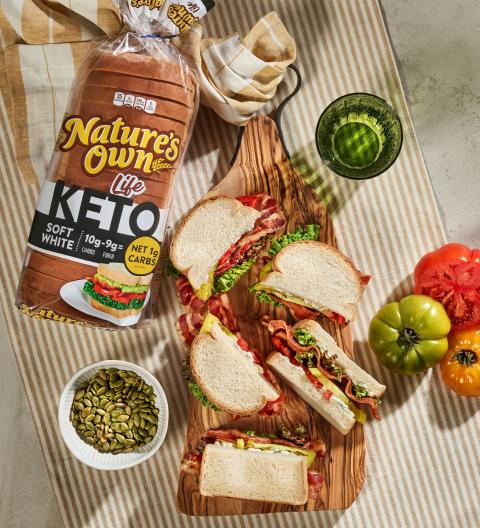
These introductions come as a growing number of consumers are reading product labels in an effort to address various health concerns for themselves and their families – a trend that was highlighted at the 2023 International Dairy Deli Bakery Association (IDDBA) Show held in Anaheim, Calif. last month.
During a presentation about five guiding trends that grocers should be focused on now, Heather Prach, VP of education at Madison, Wis.-based IDDBA, spoke about one that’s directly related to the bread category: whole health, whole heart.
“Consumers are more educated about nutrition and physical health than ever before, and they want to know what they’re putting in their bodies,” she noted.
At the same time, there’s not one definition for healthy, Prach emphasized, observing that it “can vary based on viewpoints that are generational or regional. It can vary based on food allergies or results-based diets, but there’s a wide range of these physical callouts that each individual is looking for. So, if you’re trading up for ingredients, make sure that you’re making those callouts on your labels and on your packaging. This is also true with clean ingredients. Any and all attributes should be clearly called out. Labels matter, and shoppers have become label readers.”
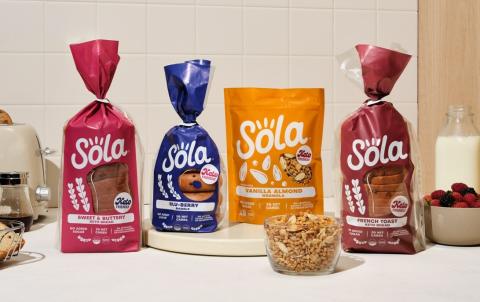
Also during the IDDBA Show, Rick Stein, VP of fresh foods at Arlington, Va.-based FMI – the Food Industry Association, shared some key data from the group’s annual bakery report that finds there’s no one-size-fits-all definition for how Americans are eating nowadays.
“We asked customers about their eating approaches, and most customers said they don’t like using the term ‘diet,’” Stein noted. “Sixty-five percent of customers are trying to follow some type of eating behavior, and health-mindedness is very much on their mind. About 70% of customers say they’re looking for callouts. They’re looking for information when they’re shopping in the department so they can understand what resonates with them. The highest one is whole grains, 31%.”
Stein emphasized that retailers “need to be speaking about health and well-being in the bakery.”
The Keto Craze
Fortunately for grocers, plenty of brands are working diligently to address these concerns in the bread aisle and bakery. One of the biggest trends in recent years has been products that fit into low-carb and keto diets.
The team behind Thomasville, Ga.-based Flowers Foods’ Nature’s Own brand decided to launch a keto-specific product earlier this year after seeing the success of its Nature’s Own Life Honey Wheat bread, which has 7 net carbs per slice, according to Brent Bradshaw, SVP, core brands at Flowers Foods.
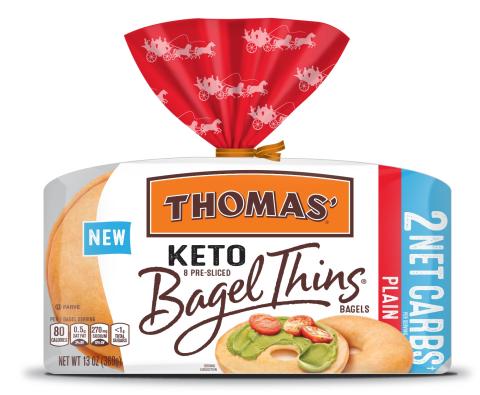
“We wanted to push the envelope even further and develop a product with even fewer net carbs,” he notes. “Our Nature’s Own Keto Net One loaf is great for consumers with a keto lifestyle. The carbs minus the fiber yield a very low net carb count. The bread also has 6 grams of protein per slice, which will be a great addition for a keto-friendly meal.”
The keto trend is extending to breakfast breads, too. Thomas, the brand known for its English muffins and bagels, launched its first-ever keto product, Thomas Keto 2 Net Carb Bagel Thins, in April. This product was developed specifically for those following a keto diet, notes John Lee, VP and general manager - breakfast at Bimbo Bakeries USA, the Horsham, Pa.-based company that owns the Thomas brand. “These are a perfect choice for consumers looking for a low-carb, high-fiber breakfast option,” he says.
Recognizing that a growing number of consumers are taking more time to read product labels, the company put “keto” in simple, bold typeface on its package design, notes Lee.
Sola, a line of chef-created products that were designed as low-carb options to help the estimated 123 million Americans with diabetes and pre-diabetes, recently unveiled a brand refresh that will position the company’s bread, buns and bagels as “the only national non-GMO, low-carb brand in the commercial bread aisle,” according to the Houston-based company. The refresh includes a new logo, updated packaging and ingredient reformulation. In addition, the full product portfolio will now be Keto Certified.
Ashley Findlay, senior marketing director for Sola, shares that more than 160 million Americans are counting carbs these days, so, in her view, “low-carb is no longer a niche.” In fact, low-carb bakery has grown 26% in the past year, she observes, citing data from Chicago-based SPINS.
Consumers are now looking for this type of product in the commercial bread aisle, emphasizes Findlay, adding that Sola’s “30-day ambient shelf life supports this placement.”
Findlay suggests that retailers that are looking to grow sales leverage brand blocking with top-selling bread and bagel items and add more innovative products to meet all of their customers’ need states. She also advises that retailers promote bread during high seasonality periods, including the new year and back-to-school time.
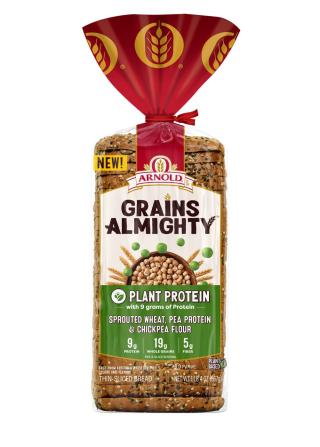
Bread With Benefits
Another growing area in the better-for-you bread segment is the use of “superfoods” as ingredients, along with other functional food benefits. In April, Bimbo Bakeries USA’s Arnold, Brownberry and Oroweat Breads launched Grains Almighty, a small-sliced line initially featuring Grains Almighty Gut Balance, made with prebiotics, and Grains Almighty Plant Protein, which features more protein and is made with a balance of chickpea flour and whole grains. The line debuted in the Northeast market and is expanding nationally this fall.
These offerings tap into a “functional foods market that’s still in its infancy,” notes Lorraine Hale, VP and general manager – bread, buns/rolls at Bimbo Bakeries USA. “The functional foods space is not just a passing trend,” she adds. “The focus on gut health and interest in plant-based foods is going to continue to increase.”
Hale points out that the new breads’ key ingredients are clearly marked and easy to find on the packaging to serve health-conscious consumers.
The Kroger Co. certainly had health-conscious shoppers in mind when it developed two new better-for-you bread offerings under its Simple Truth private brand. In April, the Cincinnati-based retailer introduced Seeded Multigrain Bread and Multigrain Quinoa Bread, both of which are Upcycled Certified by the Denver-based Upcycled Food Association. The designed-from-scratch bread is blended with upcycled barley, wheat and rye grains, with each variety topped with nutrient-dense ingredients like sunflower, flax, black sesame and pumpkin seeds and quinoa.
As 2023 progresses, it seems likely that more retailers will follow suit by developing new better-for-you breads and other products under their own brands or, at the very least, adding other suppliers’ items to their merchandising plans. By doing so, they’ll address their shoppers’ growing appetite for healthier choices, whether those products are tied to specific diets or just general health concerns.
As the saying goes, everything old is new again. In the case of bakery products, however, “everything” is apparently one of the latest crazes. Thomas, a brand owned by Horsham, Pa.-based Bimbo Bakeries USA, recently introduced Everything Mini Bagels – and while these products are labeled as “everything,” they’re actually lower in calories and carbs than traditional bagels, especially since they come in a controlled-portion size.
Nature’s Own, meanwhile, recently launched its Perfectly Crafted Artisan Style Everything Bun that has “an ideal blend of everything seasoning,” according to Thomasville, Ga.-based Flowers Foods.
Another example is Wholesome Harvest Everything Bread, launched in 2021 by Bimbo Bakehouse, a division of Bimbo Bakeries USA. The “everything” flavor in the in-store bakery bread and rolls category has grown 12% in unit sales over the 52-week period that ended Jan. 22, according to IRI data cited by Bimbo Bakehouse.




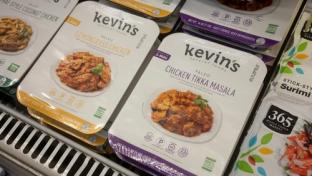

5c84.jpg)

